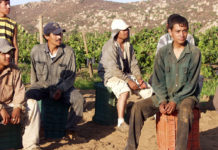post-colonialism that led to entrenched urban poverty after rapid urbanization.
The 70 to 100 children who were subjects of the study — and were living on the streets of Ruiru, a satellite city of Nairobi — abused solvents like glue. They said it made their lives easier, and even the World Health Organization acknowledged that solvent use was “functional” and utilized to placate emotional and physical pain.
“You don’t feel like eating …” said a child named Gitau, who was interviewed for the study. “At night you can’t feel even the cold … you can sleep outside when it’s raining and maybe you could not know it is raining.”
Inhaling solvents also allowed these children to eat garbage, handle insect bites, deal with the loss of dignity from being on the dirty streets, and the hard life of begging and violence.
While the children in Kenyan slums huff inhalants to ease their pains, many mothers make up the majority of solvent dealers and sell the poisonous chemicals to other children in order to feed their own. The poverty in Kenya creates a vicious cycle and a feedback loop that neither mother nor child can escape from by abusing substances.















